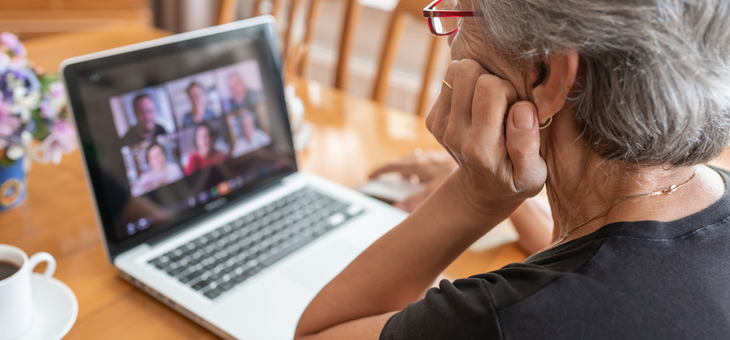Virtual contact during the pandemic can be more harmful to older people’s mental health than no contact at all, according to a new study.
The past 18 months has seen an explosion in the use of online communication technologies, such as Zoom and Skype, as lockdowns have separated friends and families like never before.
The study, published in the journal Frontiers In Sociology, examined populations of older people in the US and UK and looked at the relationship between contact methods and mental health during COVID lockdowns.
“In both countries, more frequent inter-household face-to-face contact during the pandemic was associated with better general mental wellbeing, but inter-household virtual contact, via means such as telephone and digital media, was not associated with general mental wellbeing” the study states.
“The increase in loneliness following the outbreak of the pandemic was greater for older adults who reported more virtual contact.”
Read: How you can embrace technology
Dr Andrew Thompson, a doctor with online medical service InstantScripts, says Australians have faced similar increased mental health pressures during lockdowns here.
“The lockdowns have thrust Aussies into an abnormal environment,” he says.
“Many of us are juggling high-pressure jobs with parenting and home schooling and, as restrictions continue to tighten, are unable to call on the helping hands of family, friends or professionals.
“Many single households have to grapple with loneliness.”
Technological advances may have made it possible to see the faces and hear the voices of your loved ones wherever they are, but it seems the stress and pressure of learning new processes can outweigh any potential benefits. Lack of technical knowledge can end up adding to feelings of isolation rather than alleviating them.
“We were surprised by the finding that an older person who had only virtual contact during lockdown experienced greater loneliness and negative mental health impacts than an older person who had no contact with other people at all,” Dr Yang Hu, senior lecturer in sociology and data science at the University of Lancaster and one of the authors of the Frontiers in Sociology study, told The Guardian.
“We were expecting that a virtual contact was better than total isolation, but that doesn’t seem to have been the case for older people.”
“It’s not only loneliness that was made worse by virtual contact, but general mental health. These people were more depressed, more isolated and felt more unhappy as a direct result of their use of virtual contact,” Dr Hu says.
The superficial nature of online contact may not be the only problem, with a survey conducted by researchers at RMIT University finding adult children and grandchildren were often unwilling or frustrated at explaining new technology to older people.
“Among those who asked for tech advice, 44 per cent were most likely to approach their adult children first,” the studies’ authors wrote for The Conversation.
“A further 23 per cent listed their children as their second choice. But they weren’t always helped with a smile.
“Many respondents said their adult children didn’t have the patience or willingness to help. Follow-up interviews with older Australians revealed that explaining new apps and constantly evolving technologies to someone who isn’t a digital native can carry a lot of emotional tension.”
Read: Mental health requests skyrocketing
The RMIT study found that older Australians were most comfortable using computers and least comfortable with tablets. It also found that for people experiencing difficulties with their children helping them with using new technology, websites such as YouTube have proven a valuable asset.
“YouTube is good because you can run a YouTube and, as you’re running it, you can stop it, do what you’ve got to do, and then come back and run it a bit more, and do the next part of it,” says 77-year-old Peter, a respondent in the RMIT study.
How have you found the switch to virtual contact? Are family members willing to help you learn without an attitude? Let us know in the comments section below.
If you enjoy our content, don’t keep it to yourself. Share our free eNews with your friends and encourage them to sign up.

